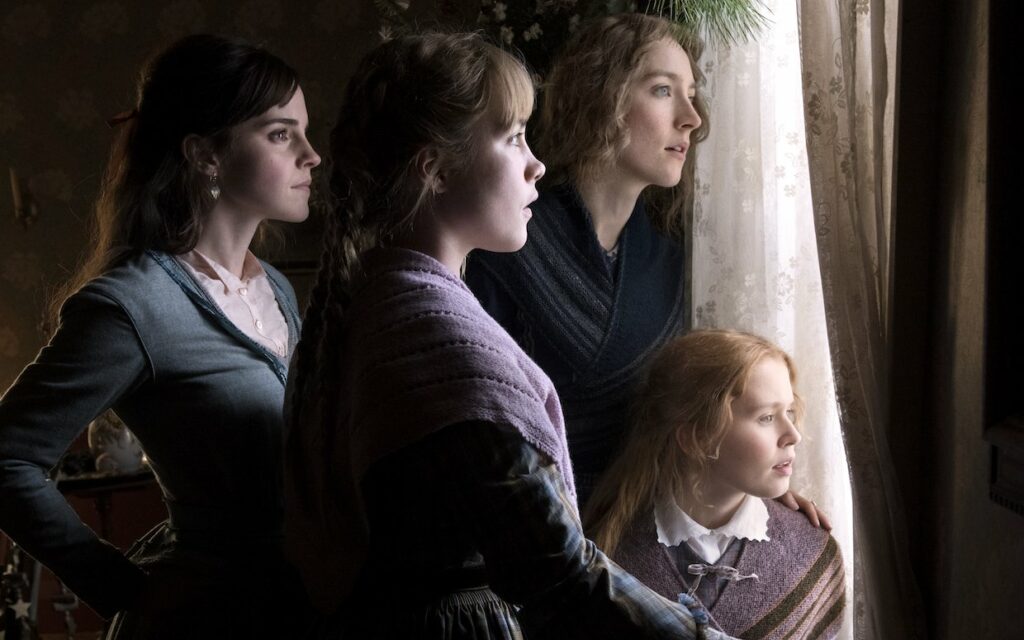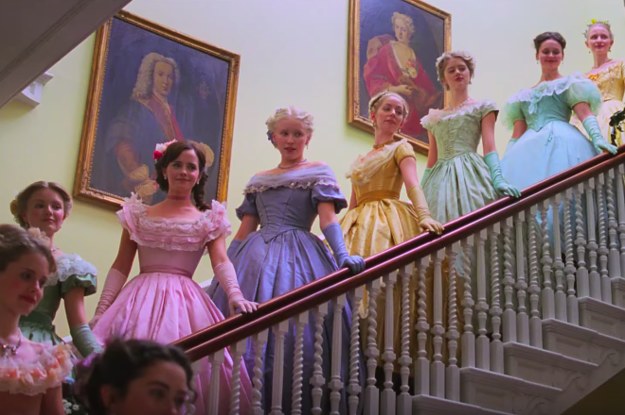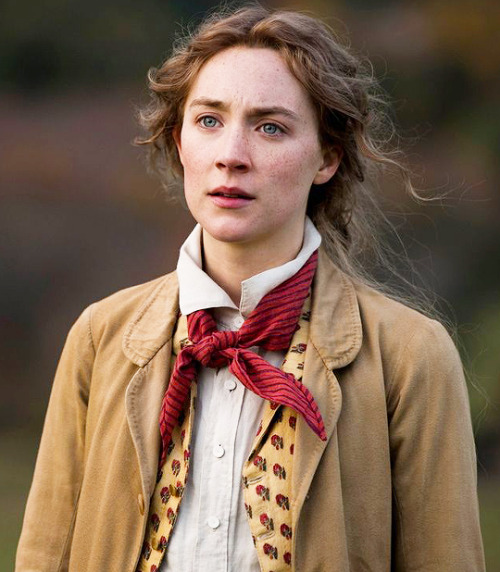Little Women (2019)

DIRECTOR: Greta Gerwig
CAST: Saoirse Ronan, Emma Watson, Florence Pugh, Eliza Scanlen, Laura Dern, Timothée Chalamet, Chris Cooper, Meryl Streep, Tracy Letts, James Norton, Bob Odenkirk, Louis Garrel
REVIEW:
When it comes to a story that’s been adapted as many times as Louisa May Alcott’s 1868 novel Little Women (most prominently by Gillian Armstrong in 1994), the differences between versions of such an oft-told story are matters of performances and screenwriting choices. Comparing Greta Gerwig’s adaptation to Armstrong’s is a bit like comparing apples and oranges. Armstrong’s was a straightforward telling. Gerwig juggles the time frame and deconstructs some aspects while (as might be expected from her prior cinematic output) honing in on the feminist elements. The result is intriguingly “different” enough to have a valid claim to exist as its own thing, but in some ways is a less satisfying experience.
The biggest innovation Gerwig does to shake things up is to start out in a “present” where Josephine “Jo” March (Saoirse Ronan) is already living on her own in New York City, struggling to sell her stories to often unimpressed publisher Mr. Dashwood (Tracy Letts) and breaking off her friendship with semi-romantic undertones with Professor Friedrich Bhaer (Louis Garrel) when he is blunt in his critiques of her work. Meanwhile, we also drop in on her three sisters. Amy (Florence Pugh) is painting in Europe where she has accompanied her wealthy and cantankerous Aunt March (Meryl Streep) and has a chance reunion with old family friend Laurie (Timothée Chalamet). Meg (Emma Watson) is struggling to make ends meet with her poor tutor husband John Brooke (James Norton). And sickly Beth (Eliza Scanlen) is in failing health, her heart weakened from scarlet fever contracted years earlier. Gerwig liberally time-jumps back and forth between the present and the past, where we see the March sisters in younger carefree days under the same roof, with Jo fending off Laurie’s romantic advance and fostering a single-minded determination to be a writer.
The continuous cross-cutting between the past and present is a double-edged sword. While it immediately sets this version apart as its own thing (which one could argue is necessary when telling a story that’s been told so many times before), it also has the effect of leaving events feeling fragmented and scattershot, leaving us feeling like we’ve been unceremoniously dumped into the middle of a story before we’re properly oriented to everyone’s backstories, histories, and interpersonal dynamics, and leaving some relationships feeling thinly-developed (the Jo/Friedrich relationship is perhaps the biggest victim of this, and here the Amy/Laurie romance feels more developed than the abortive one between Jo/Laurie). There’s a bit of a “greatest hits” feel, skimming through all the expected pivotal moments. This is mitigated by the effectiveness of various stand-alone individual scenes, including a couple quietly affecting one-on-one heart-to-hearts between Jo and family matriarch Marmie (Laura Dern), and a moment when Laurie’s grandfather Mr. Laurence (Chris Cooper), who gifts his piano to Beth because she reminds him of his own daughter who died young, secretly sits down on the staircase to listen to her play. And the time-jumping occasionally works effectively to contrast the past with the present, especially in the difference between a sepia-toned idyllic playful outing at the beach with all the March sisters and their suitors, contrasted with a poignant moment in the present with Jo and Beth alone on the beach, with Jo holding her fading sister in her arms and reading to her.

Lest book purists grumble too much, this is not some radical re-imagining; despite Gerwig’s fiddling with chronology, it is at its essence a fairly straightforward and faithful adaptation of Louisa May Alcott’s Little Women, and while their placement in the tangled timeline might not always be in chronological order, most of the key scenes are present and accounted for: Jo’s haircut, she and Laurie’s playful dance outside the ball, Amy’s petulant destruction of Jo’s novel, Amy’s rescue from the frozen pond, Laurie’s failed proposal, etc., and this version actually improves on its predecessors in a couple small ways, including the Laurie/Amy romance and Beth’s friendship with Mr. Laurence being somewhat better-developed. Unlike the 1994 version, which recast the grown-up Amy, Gerwig makes the interesting decision to have Amy played at both ages by Florence Pugh, using little more than changing wardrobe and hairstyle to make her look more girlish or more adult. This works effectively enough, and ensures more continuity of character than in the 1994 version where Amy felt like a different person from Kirsten Dunst to Samantha Mathis. The biggest liberty and the most controversial alteration is undertaken in the 11th hour; it’s generally believed that Little Women is at least semi-autobiographical, and in the climax Gerwig goes “meta” with this, incorporating aspects of the real Alcott and blurring the lines between she and her protagonist (which scholars generally believe Alcott at least partially based on herself) and injecting an ambiguous story-within-a-story “twist” to the way things wrap up. While a perfectly valid and, in and of itself, even intriguing spin, it diminishes the book’s ending and may leave purists disgruntled.

The cast is a mixed bag. The standout (unsurprisingly considering she’s the juiciest role accorded central focus) is Saoirse Ronan, who is able to stake her own worthy claim to the oft-played role of Jo March and make it her own. Ronan uses her luminous eyes and emotionally expressive face to good effect, giving a spirited performance that is by turns lively, tempestuous, heartfelt, and vulnerable without ever striking a false note, giving Winona Ryder’s much-praised version a run for its money as the best Jo March to appear onscreen (like Ryder, Ronan’s Jo has received an Oscar nomination, and this is the second time Ronan has been nominated under Gerwig’s writing and direction, previously for 2017’s Lady Bird). The other “sisters”—Emma Watson, Florence Pugh, Eliza Scanlen—are adequate, with Pugh perhaps the strongest (she gets a nice meaty monologue about the limited options afforded to 1800s women), but none of them stand out as forcefully as Ronan. Less successful is Timothée Chalamet (also reunited with Gerwig and Ronan from Lady Bird), who feels miscast and whose Laurie feels shallow. Ronan holds her own when stacked up against previous versions; the same is not true when it comes to Chalamet versus Christian Bale. Chalamet and Ronan are acceptable as friends but don’t “click” the way Bale and Ryder did, and he has even less chemistry with Florence Pugh, partially hamstringing the Amy/Laurie romance even though the script gives it (and the character of adult Amy in general) more development than the 1994 version did. In the supporting cast, Meryl Streep is enjoyable and gets a few acerbic one-liners as the tart-tongued Aunt March, but with the possible exception of an almost unrecognizable Chris Cooper as Mr. Laurence, the men are just “there”. Despite being a conspicuously younger (some would say more age-appropriate) Friedrich, French actor Louis Garrel is a relative non-entity (though his scant screentime doesn’t help), and his relationship with Jo is thinly-developed; when we’re told Jo loves him, it feels unearned and unconvincing. Equally “just there” are James Norton as Meg’s poor tutor husband John Brooke, and Bob Odenkirk (who doesn’t show up until halfway through) as the March father. Tracy Letts (who, for a low-profile character actor, is having a bit of an uptick recently with roles in The Post, Ford v. Ferrari, and now this) provides a little comic relief as Jo’s publisher Mr. Dashwood (he and Ronan share an enjoyable confrontation of back-and-forth haggling over payments and copyrights). Arguably the standout in the supporting cast is Laura Dern, who exudes warmth as the March matriarch; Marmie tends to be portrayed onscreen as an unassailable mother figure who exists to be a steady rock and hand down nuggets of wisdom, but Dern is aided by a screenplay that humanizes her, playing a somewhat softer version of the character and getting to show a little more layering.
Little Women is a rather handsome production—period details are impeccable, and production design and costumes are sumptuous—with a number of strong moments in the mix, and Saoirse Ronan’s interpretation rivals Winona Ryder’s for the best onscreen Jo March, but a fragmented and scattershot feel induced by excessive time-jumping and a few miscast and/or poorly-developed characterizations keeps it from equaling the 1994 adaptation. The two versions are different enough to warrant their separate existences, but this adaptation is unlikely to be as beloved in its own right.
**1/2